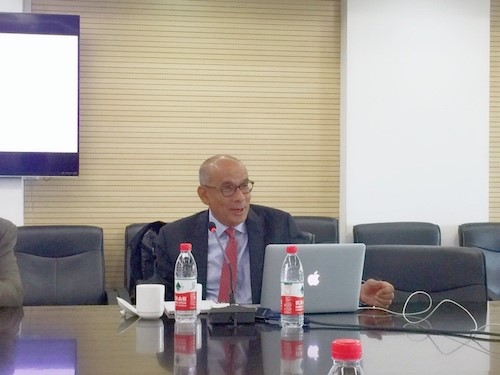Peking University Wang Tieya International Law Lecture Series——“TWAIL in a Changing World Order” was successfully held
Date:2018-11-23
On the afternoon of October 11, 2018, the Lecture "TWAIL in a Changing World Order"of the Wang Tieya International Law Lecture Series was successfully held by the Institute of International Law of Peking University in Room 303, (Leo) Koguan Building. The lecture was hosted by Prof. Li Ming, Director of the Institute of International Law, and lectured by Antony Anghie, a famous international law scholar and Professor of the National University of Singapore and the University of Utah.

At the beginning of the lecture, Prof. Antony Anghie talked about the work of Mr. Wang Tieya, which played a great guiding role in his understanding of Chinese international law, and expressed his reverence for Mr. Wang Tieya. Prof. Antony Anghie first raised the question, how can international law be used to make the people of third world countries live better? In order to answer this question, he led everyone to review the history of the development of international law: from the nineteenth century when European international law became a tool for colonialism to squeeze and persecute the people of third world countries such as Africa and Asia, to the period of the National Independence Movement after the two world wars, and the 1980s and 1990s when third world countries tried to change international law system. He pointed out that before European international law became a universal discourse system, regional "international law" existed in the third world countries, and the colonialism in Europe in the nineteenth century was the foundation and core of the theoretical construction of international law. The characteristics of the doctrine even continued to the present. For example, the World Bank, the International Monetary Fund's differential treatment of third world countries, and the practice of the International Criminal Court and the Arbitral Court in the African region fully demonstrated that today's international law was still full of the legacy of colonialism.
Prof. Antony Anghie also mentioned that we generally think that the Westphalian Peace Convention is the starting point of international law, but in his view, the real starting point of international law is the third world countries. International law originated in Europe, Spain, Portugal, the United Kingdom and other European countries and East India companies ruthless plunder and colonial rule of third world countries. Concepts of “possession” and “property” are inseparable from international law. He believed that the development of international law was the process by which Western countries deny the sovereignty of third world countries and exclude them from the main body of international law. Today, the concept of third world countries may have changed in itself. Prof. Antony Anghie believed that third world countries are ubiquitous, even within the European region, and international law had become a tool for their own oppression. Therefore, he concluded that the discourse system of European international law alone could never understand our own culture and history, nor could it change the destiny of third world countries and people.
After the lecture, the students raised some questions including how to treat today's "colonialism", the legitimacy of regional "international law", and how third world countries contribute to changing international law. Prof. Antony Anghie responsed to these questions one by one. Finally, Prof. Li Ming presented a souvenir to Professor Antony Anghie on behalf of the Institute of International Law of Peking University and took a group photo.
Translated by: Wang Yanwei
Edited by: Zhu Mengyuan



